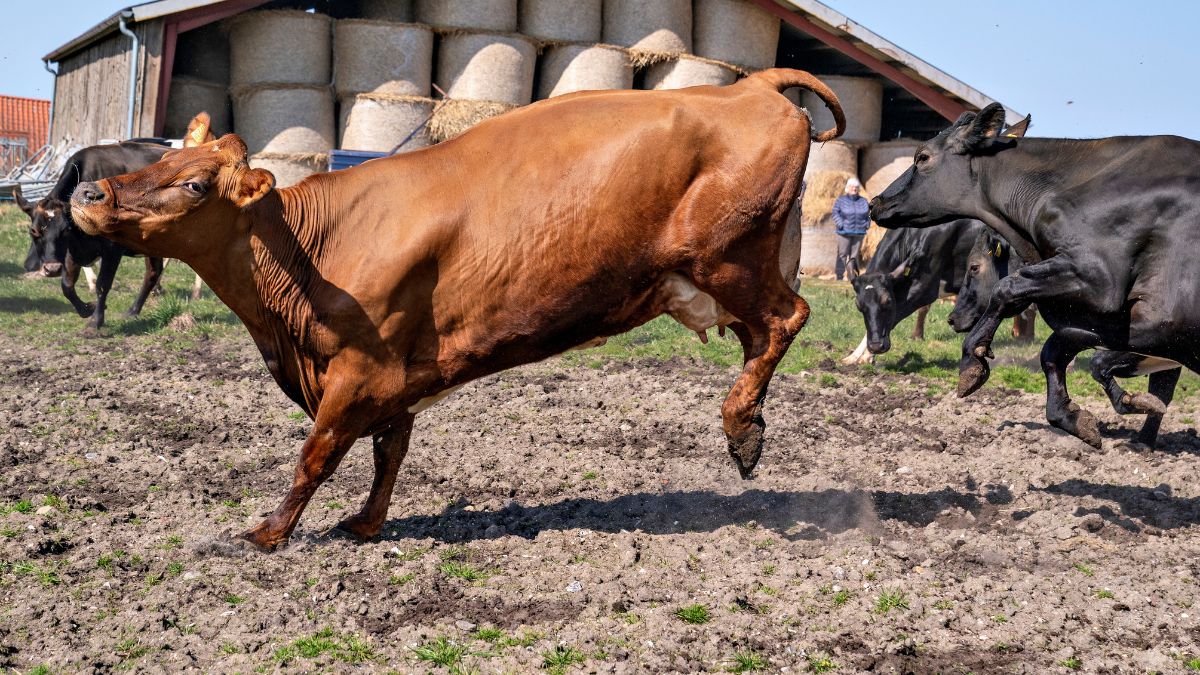Denmark has found a unique way to rein in its methane emissions – by taxing burps and flatulence by livestock. The Danish coalition government, comprising three parties from across the political spectrum, reached a deal with farmers, environmental groups and other stakeholders last week.
This is not the first time that a country has decided to bring a tax on agricultural emissions. A similar bill was being considered by New Zealand under former Prime Minister Jacinda Ardern in 2022. However, the later government scrapped it.
Is taxing cattle emissions the answer? Let’s understand.
The problem of methane emissions
Methane, the second most common greenhouse gas after carbon dioxide (CO2), accounts for about 16 per cent of global emissions.
It is 28 times as potent as carbon dioxide in contributing to global warming by trapping heat in the atmosphere. Over a 20-year period, methane has around 84 times the warming potential of CO2.
The food system is responsible for a fourth of global greenhouse gas emissions. According to the United Nations, livestock alone accounts for about 32 per cent of human-caused methane emissions.
Human activities, including those in the agriculture sector, drove at least two-thirds of methane global emissions, as per the 2024 Global Methane Budget.
The planet’s 1.5 billion (150 crore) cows and other livestock expel methane emissions through their farts, poop and burps.
The Global Methane Pledge (GMP), launched at COP26 by the European Union (EU) and the United States, has set a target to cut global methane emissions by 30 per cent by 2030.
Impact Shorts
More ShortsDenmark’s new cattle emissions tax
Denmark has decided to implement the world’s first emissions tax on livestock.
From 2030, the Danish government will charge farmers 300 kroner (around Rs 3,580) per tonne of carbon dioxide equivalent produced by their livestock, including cows and pigs. This rate would increase to 750 kroner (about Rs 8951) in 2035.
However, the tax will be offset by a 60 per cent tax deduction, which means the actual cost per tonne will begin at 120 kroner (Rs 1,432) and rise to 300 kroner (Rs 3,580) by 2035.
The rebate will increase if farmers use feed additives to curb methane from cow burps or other methods to reduce methane emissions.
According to Danish officials, the levy would reduce emissions by about 1.8 million metric tonnes of carbon dioxide equivalent in 2030, reported The Washington Post.
Denmark’s green transition minister, Jeppe Bruus, told New York Times (NYT), “a tax on pollution has the aim to change behaviour”.
New Zealand unveiled a similar plan to tax sheep and cattle burps in 2022. However, it was axed by the new government in June this year.
Is imposing a tax enough?
Experts say farmers need to be provided support to help them tackle emissions of methane by their livestock.
Joseph McFadden, associate professor of dairy cattle biology in the Department of Animal Science at US’ Cornell University, wrote for Time magazine last year, “We cannot ask farmers to lower methane emissions without providing them effective, safe, and profitable solutions.”
Feed additives are one such solution. These are products used to enhance the quality of feed to meet the need for certain nutrients or to improve an animal’s performance.
He said, however, studies are needed to find out about the efficacy of feed additives.
“Little consideration has also been given to alternative ways of actually delivering methane-reducing feed additives to cattle. Although the common approach in conventional cattle systems is to provide a feed additive in a cow’s diet, this approach may not be suitable for ruminants that graze pasture. Providing the feed additive in water or as slow release capsule provided directly to the cow’s stomach may be more suitable for this farming practice,” McFadden wrote.
As per the Time magazine article, the cost of buying a feed additive, in the absence of government support or incentives, and a lack of focus on the widespread adoption of methane-mitigating technologies could be major challenges in reducing greenhouse gas emissions from agriculture.
Resistance from cattle farmers and the agricultural industry is another likely bottleneck.
With inputs from agencies


)

)
)
)
)
)
)
)
)



